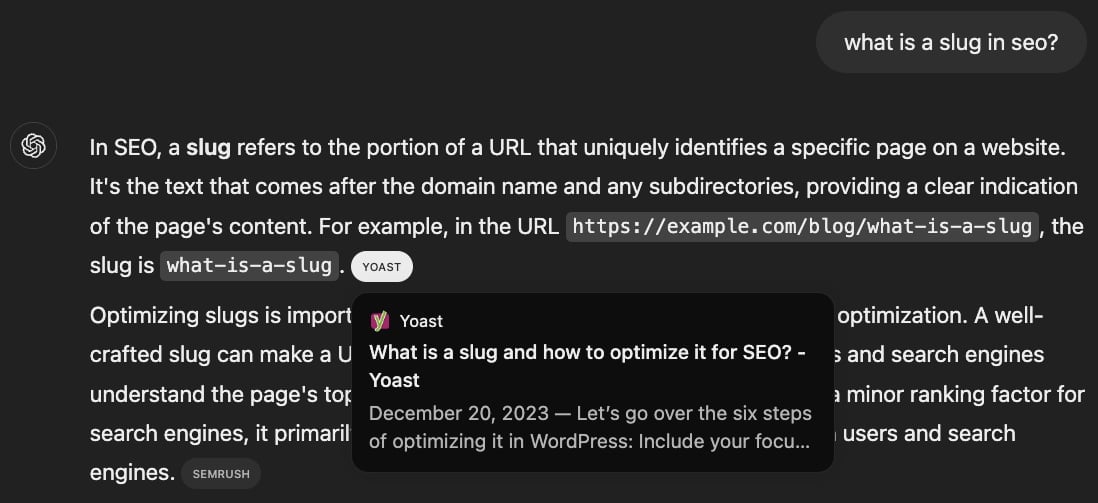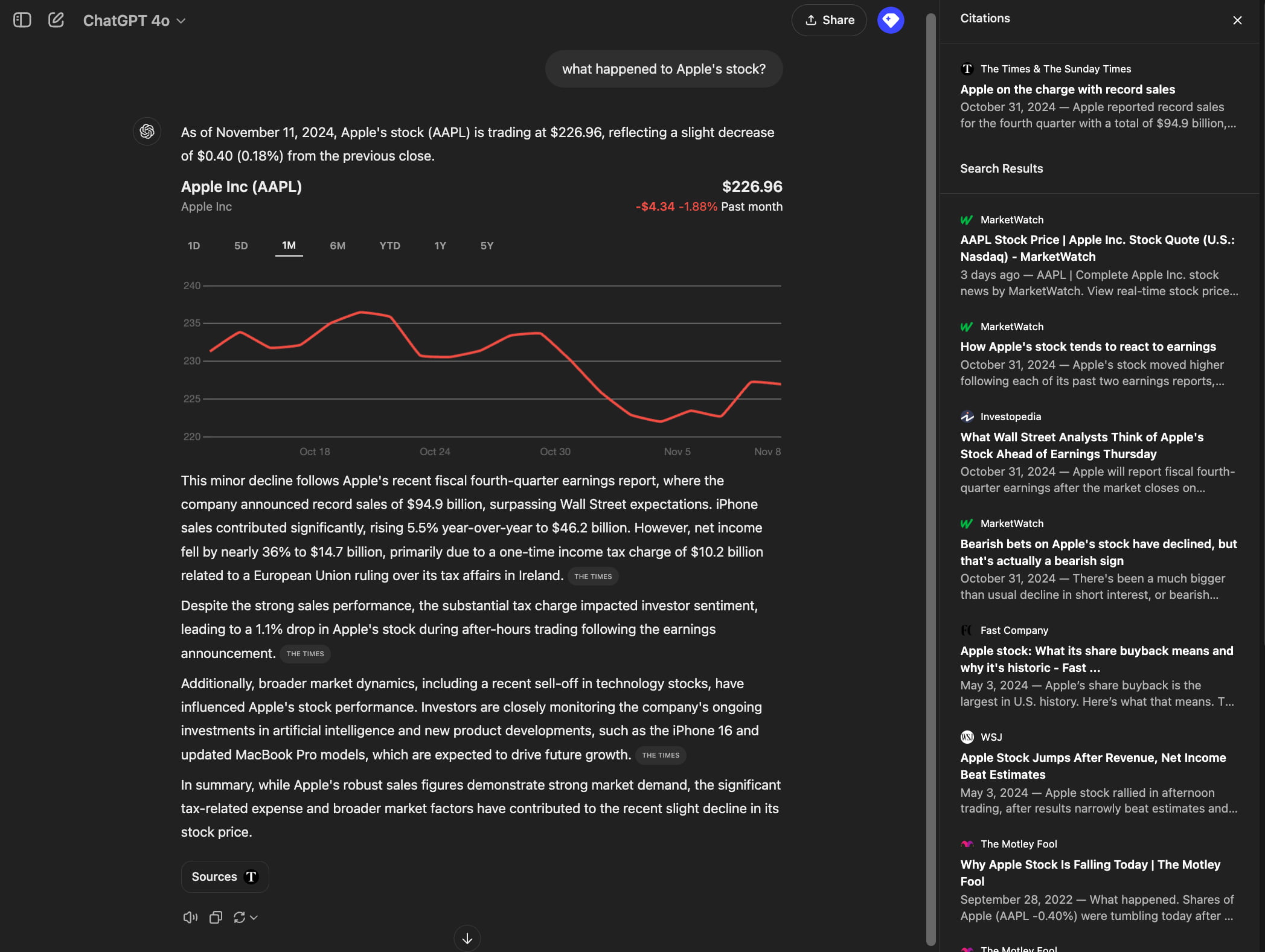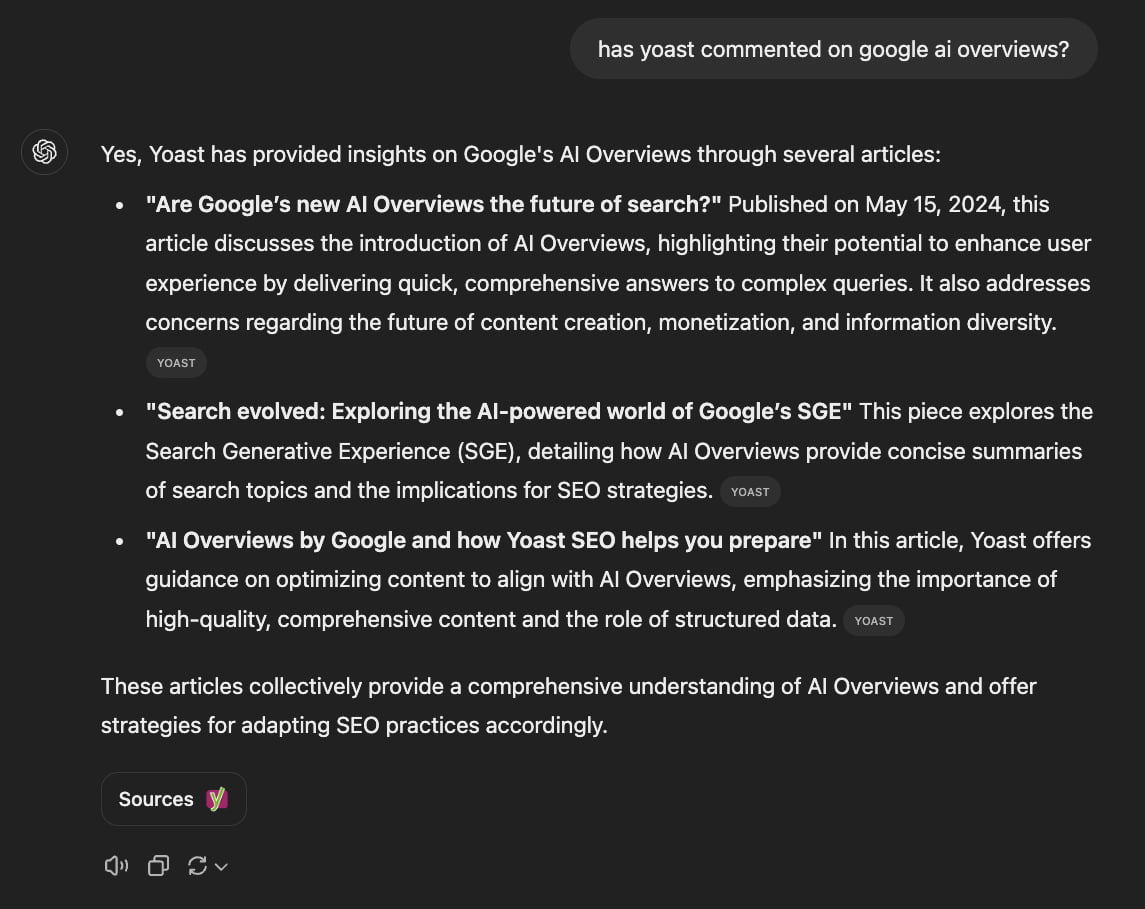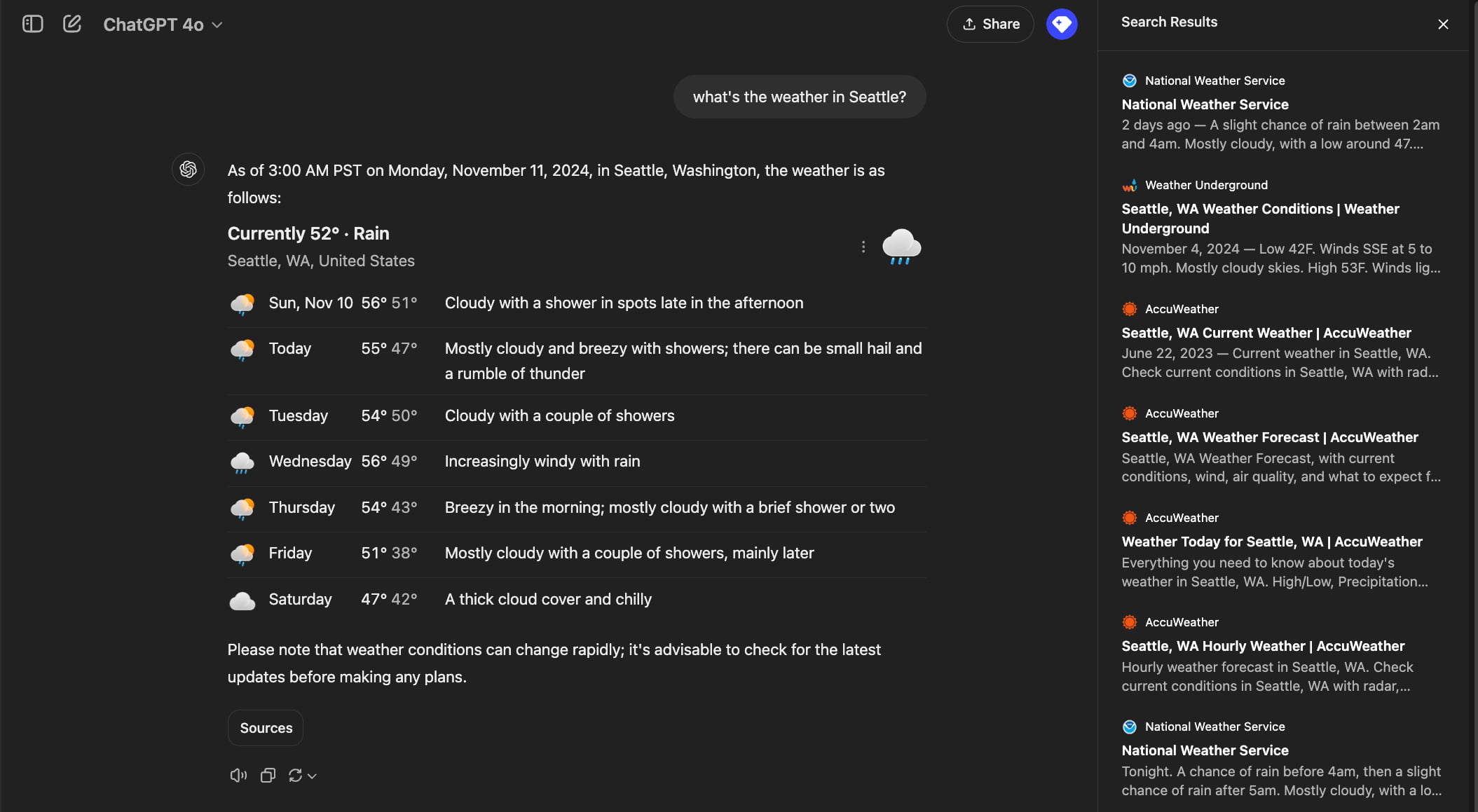Last week, OpenAI launched ChatGPT Search — a new way to search the web using AI inside a chatbot interface. Thanks to the integration of Microsoft Bing real-time data and other interesting sources, this could challenge traditional search engines.
How does ChatGPT Search work?
ChatGPT Search is a helpful tool that makes it easier to find information with a little help from AI. It is connected to the web in real time and uses Bing’s index and other sources to show up-to-date results with source links.
It’s simple to use. Just click the globe icon to activate the web search feature. Ask a question about current events, for example, and ChatGPT will determine if it needs more information. If necessary, it will gather that information in the background.
It displays the generated results and the sources used in the chat window. The sidebar adds more context and includes links. These source links let you quickly verify the information, which makes it easier to check the trustworthiness of the results. They also provide a starting point for exploring the topic further.

OpenAI works with media organizations worldwide to make sure that ChatGPT Search delivers high-quality, relevant answers. These include the Associated Press, Axel Springer, Condé Nast, Financial Times, Hearst, Le Monde, News Corp, Prisa (El País), Reuters, The Atlantic, Time, etc.
Of course, because it is a chatbot, you can discuss the search results and ask it to clarify or expand on sections. It will also show images and whatever is relevant to the search. Things like weather, stocks, maps, and sports have their own graphic interface to communicate the results clearly.
Together, these make Search a useful and versatile tool for many topics and tasks, allowing you to access them without leaving your chat window.
ChatGPT Search vs. Google’s AI
Google’s AI Overviews appear at the top of search results, providing summaries from its extensive web index. Users can click on links to access more detailed web pages. For a more chat-like experience, Gemini is Google’s main ChatGPT competitor.
ChatGPT Search is part of the ChatGPT interface and allows for conversational interaction. It uses Bing’s index and other sources to provide real-time answers with source attributions. Users can ask follow-up questions, so the chat experience becomes very dynamic.

Integration with Microsoft Bing
Microsoft Bing is central to how ChatGPT Search works. While it uses various sources, Bing is currently a major driving force. It is a huge data source that helps the AI deliver current and accurate information. Thanks to Bing’s index, ChatGPT gives users the latest details on various topics. If your site isn’t in Bing’s index, it won’t appear in ChatGPT’s results. So, getting your content indexed by Bing is crucial if you want it to be visible.
Bing’s index gives ChatGPT Search access to a wide range of information. Whether it’s news, weather, or financial data, Bing has an impressive database of topics. And while we’ve always seen the Microsoft search engine as less relevant than Google, this new collaboration puts it back in the spotlight.
Microsoft Bing doesn’t just play a technical role in the background. It has a big hand in how AI can help uncover and show information, which could help improve its position amongst the other search engines. Bing and ChatGPT Search want to change how we find and use information online.

What does this mean for SEO?
Of course, incredible technology is irrelevant if no one uses it. So, whether or not OpenAI’s new search feature will reach a mass audience remains to be seen. Still, the introduction of ChatGPT Search should make you think about your AI and SEO strategy. With Microsoft’s search engine as one of its main data sources, it’s more important than ever to get your content indexed by Bing.
Simply put, your SEO work should include Bing alongside other major search engines. Optimizing for Bing increases the chances of your content appearing in ChatGPT Search.
You should regularly check your content’s indexing status on Bing. Bing Webmaster Tools is an excellent tool for identifying gaps in indexing. Fixing these issues helps make your content visible and findable by users across both Bing and ChatGPT platforms.
Paying more attention to Microsoft Bing in your SEO plan isn’t just about increasing visibility. It also helps your site prepare for other forms of AI search technology. As ChatGPT Search becomes more widely used, it will become even more important that your content reaches its intended audience — wherever it may be.

New OpenAI crawler
OpenAI also gives us new options to control the visibility of our sites and content. ChatGPT Search comes with a new crawler — in addition to the existing GPTBot — that helps surface content show. OAI-SearchBot focuses on search tasks. It links to and displays websites in search results for the OpenAI search features. To have your site appear in search results, allow OAI-SearchBot in your robots.txt file. If you want to block it:
User-agent: OAI-SearchBot
Disallow: /
Remember that this crawler does not crawl content to train OpenAI’s generative AI models; it’s just for surfacing it.
Future developments
OpenAI plans to expand ChatGPT Search, making it more versatile and user-friendly. They aim to include features for shopping and travel queries. The goal is to give users recommendations and information within their ChatGPT interactions.
The company is also working on integrating these features with Advanced Voice Mode and Canvas, which would enable voice-activated searches and collaborative tasks. Combining all of these features makes it a very interactive, flexible tool.
ChatGPT Search could become a beloved tool for accessing information online. The search experience is already very exciting, with the ability to deliver real-time, context-rich answers. With the speed at which things move, we can expect more precise responses and interesting search features as the system learns and improves.
We’ll see improvements in more than just technology. If OpenAI keeps adding new partners, the content available through ChatGPT Search will continue to become richer and more comprehensive. These collaborations will supply high-quality information covering a broad range of topics.

Conclusion on ChatGPT Search
We’re heading into a new age with ChatGPT Search. This tool offers a very solid implementation of AI-powered search technology. Thanks to Microsoft Bing and other data sources from publishing partners, it offers a fast and efficient way to access information. We’ll see how the tool’s development goes, but it might redefine our search and SEO approach. As such, we’ll find new opportunities and strategies to help our readers uncover our content.
The post What is ChatGPT Search (and how does it use Bing data)? appeared first on Yoast.

The introduction of ChatGPT Search certainly marks an intriguing shift in how we interface with web searches. It could signal a move towards a more conversational and intuitive search experience that benefits from both real-time data and the contextual understanding characteristic of AI. However, I do wonder about a few implications of this change.
You bring up some interesting points about the introduction of ChatGPT Search. The shift toward a more conversational and intuitive search experience could really change how we interact with information. In our increasingly digital lives, I think many of us are looking for ways to make that information retrieval process feel more natural.
You raise some important points about the introduction of ChatGPT Search and its potential to transform our approach to web searches. The shift toward a more conversational and intuitive experience is certainly something to consider, as it highlights a growing trend in technology where user experience becomes central. By integrating AI with real-time data, we may find ourselves interacting with information in a way that feels more natural and adaptive to our needs.
“I’m glad you brought that up! If you’re curious about how this shift might evolve and impact our online experiences, check out this insightful resource that dives deeper into the topic.”
https://localseoresources.com/ninja
It’s fascinating to see how the landscape of search and information retrieval is evolving with innovations like ChatGPT Search. For so long, traditional search engines have been the gatekeepers of information, but tools that integrate AI—especially in a conversational format—introduce a new paradigm for how we interact with data.
I get what you’re saying about the transformation in how we find and interact with information. It’s wild to think how, not too long ago, we were all just typing keywords into search boxes, hoping to get lucky with the results. Now, tools like ChatGPT Search are flipping that script with conversations that feel way more natural. Instead of sifting through endless pages of links, we can just ask questions the way we’d ask a friend or colleague.
You’ve touched on an important shift in how we access and engage with information. The traditional model of search engines as gatekeepers has been effective, but it often relied on rigid input-output interactions, making the process somewhat transactional. ChatGPT and similar AI-driven tools present a more nuanced approach to information retrieval, allowing for a conversational dynamic that feels more natural and intuitive.
“Absolutely! To explore more about this transformative shift and how AI is reshaping information retrieval, check out this insightful resource.”
https://localseoresources.com/ninja
I find the launch of ChatGPT Search incredibly intriguing, especially given how it reshapes our interaction with information online. The integration with Microsoft Bing brings a real-time aspect that could enhance the way we search fundamentally. I’m curious about how this tool could change our perception of information reliability.
It’s fascinating to see how the landscape of searching information online is evolving with innovations like ChatGPT Search. The blend of AI capabilities with real-time data from sources like Microsoft Bing opens up new avenues for how we interact with information. In a world where we are constantly bombarded with information, having a tool that can sift through that complexity and provide answers tailored to our queries seems incredibly beneficial.
The introduction of ChatGPT Search certainly marks an intriguing shift in how we interact with information online. Integrating real-time data through Microsoft Bing could redefine not only our search experience but also our relationship with the information ecosystem at large.
The launch of ChatGPT Search is indeed a fascinating development in the realm of information retrieval. It’s intriguing to see how AI can transform the way we engage with the vast landscape of online data. Countless times, I’ve found myself sifting through pages of search results, often getting lost in the noise rather than finding the valuable insights I was after.